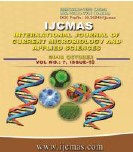


 National Academy of Agricultural Sciences (NAAS)
National Academy of Agricultural Sciences (NAAS)

|
PRINT ISSN : 2319-7692
Online ISSN : 2319-7706 Issues : 12 per year Publisher : Excellent Publishers Email : editorijcmas@gmail.com / submit@ijcmas.com Editor-in-chief: Dr.M.Prakash Index Copernicus ICV 2018: 95.39 NAAS RATING 2020: 5.38 |
Blood stream infections cause a significant morbidity and mortality worldwide. Rapid and reliable detection of bacterial pathogens and rational use of antimicrobial are required for proper management. The Aims of this study includes Isolation and identification of pathogens from blood samples using automated BacT/ALERT blood culture system and their antibiotic resistance patterns. This 6 months study covered 387 blood culture samples from septicemia patients in which 80 samples were positive for aerobic bacterial isolates. As per standard protocol further bacteriological identification and antimicrobial susceptibility testing were performed in which the most common organisms were CONS (33) and Klebsiella spp (07) in gram positive and gram negative organisms respectively. The gram negative organisms were multi drug resistance with a very high resistance to beta-lactam antibiotics except imipenem which is sensitive to all strains, whereas gram positive organisms are mostaly resistant to penicillin followed by erythromycin, clindamycin, levofloxacin and are completely sensitive to vancomycin. The present study shows the bacteriological etiology of sepsis along with their antimicrobial susceptibility pattern of septicemic isolates that may provide necessary information for the formulation of antibiotic policy and prevent nosocomial infection for effective management of such cases.
 |
 |
 |
 |
 |